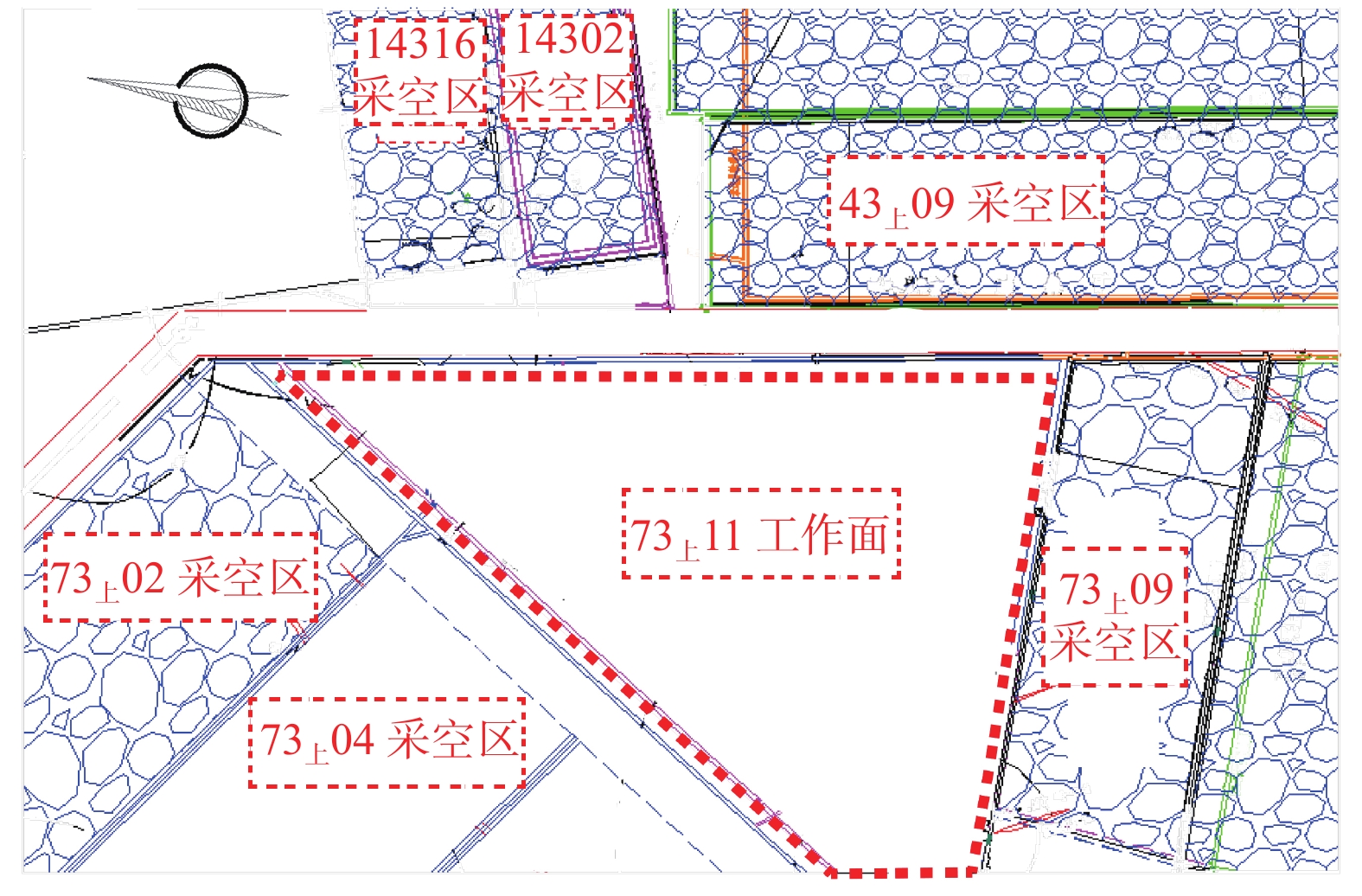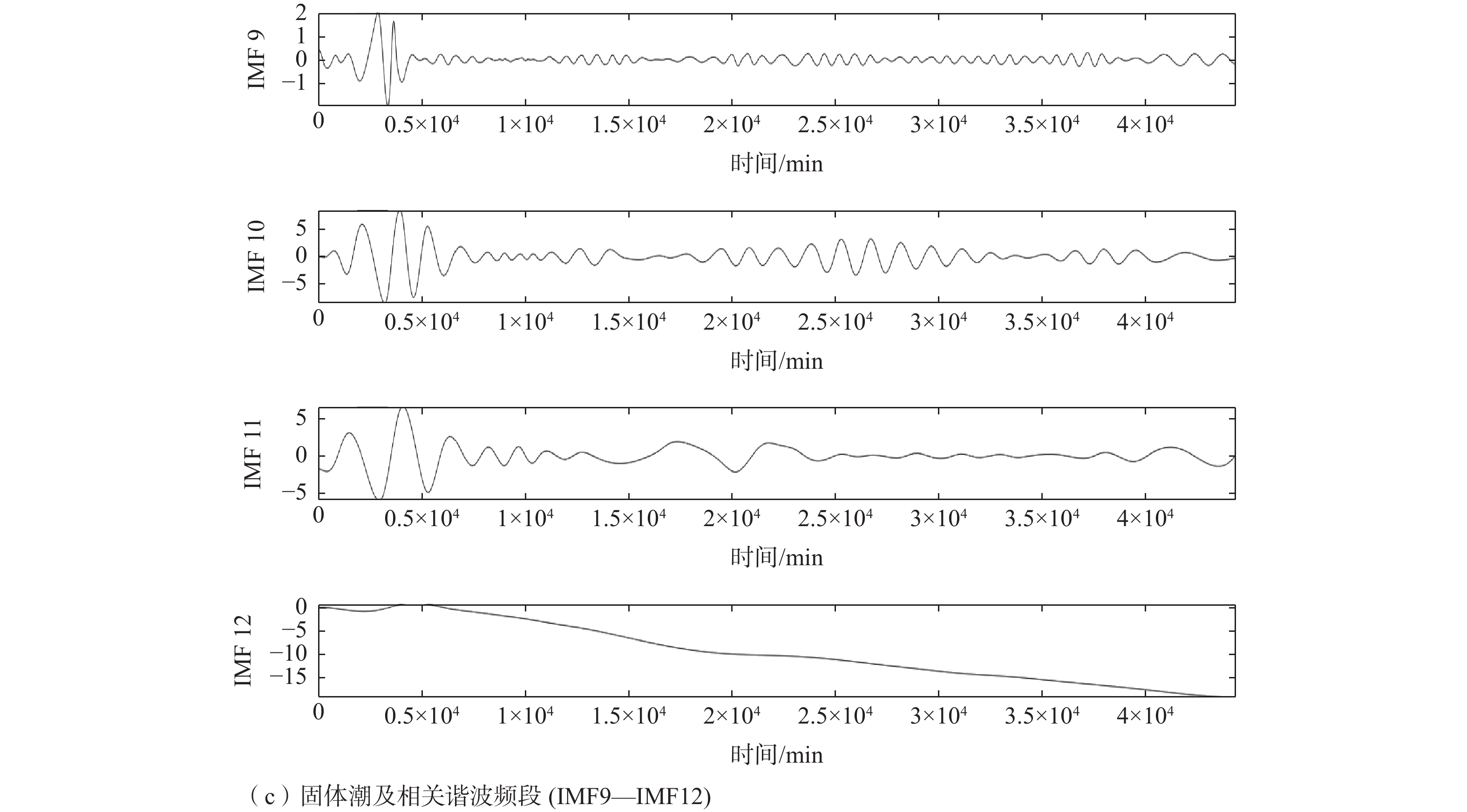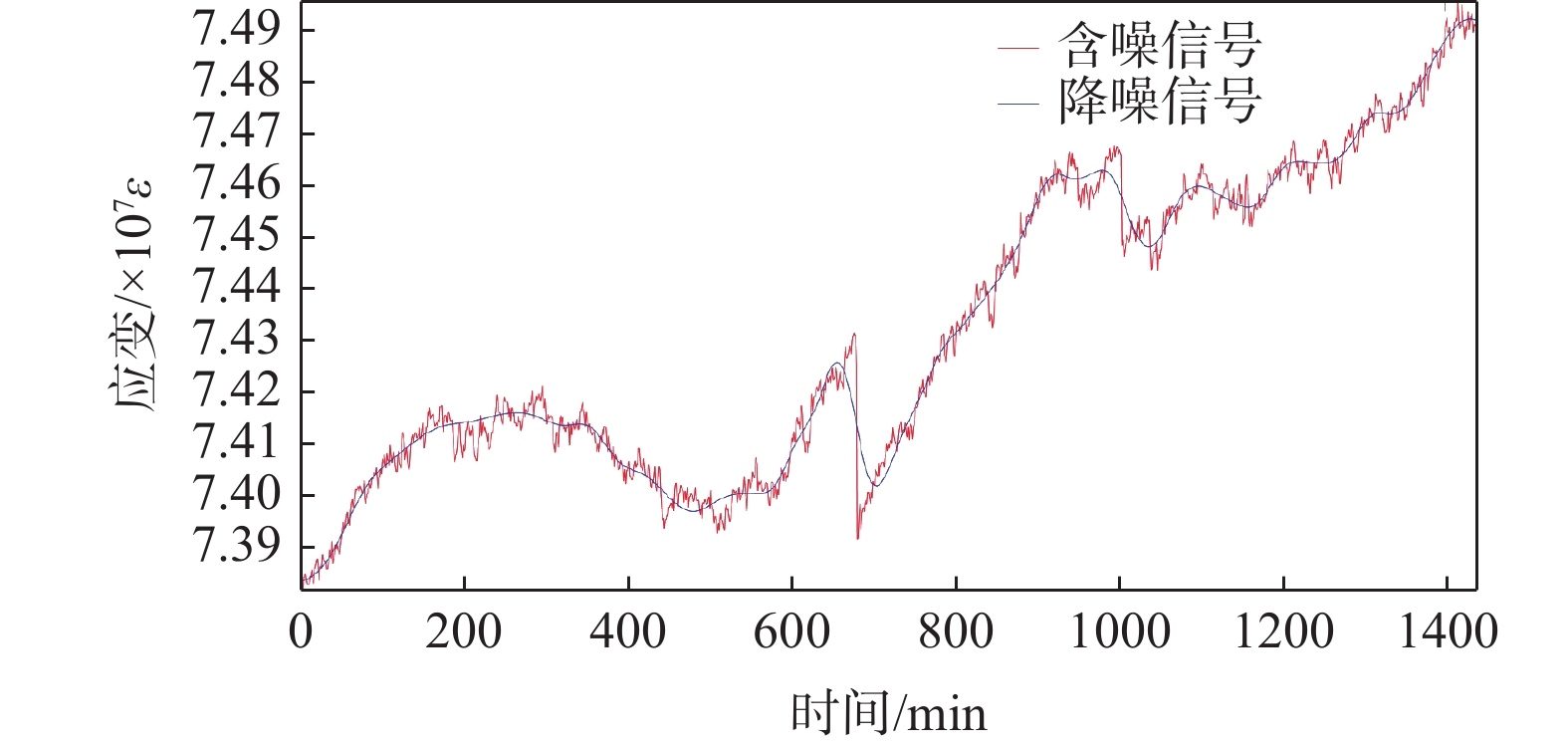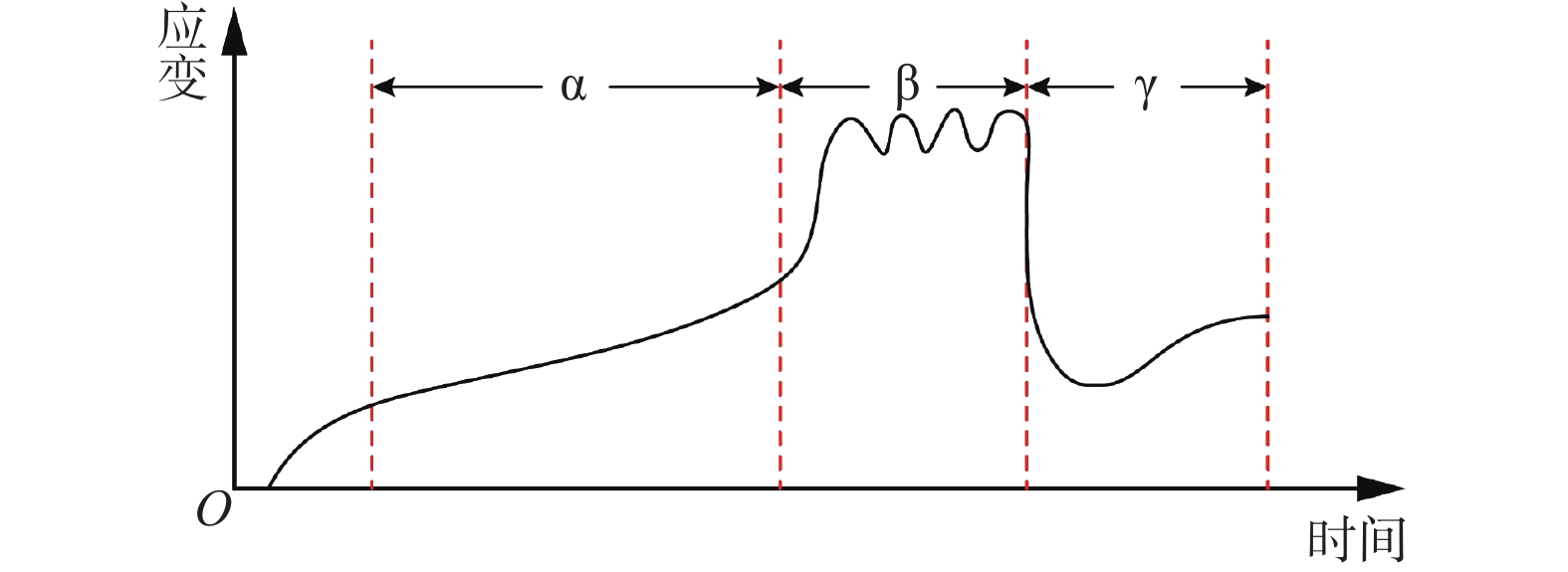Regional stress effect monitoring and precursory characteristics of dynamic disasters in deep coal mining
-
摘要:
动力灾害的孕育及诱发与区域应力场的力学行为密切相关,煤矿开采扰动作用下区域局部应力场不断调整变化。为了研究区域应力场变化特征对动力灾害的前兆响应,采用变分模态分解和希尔伯特变换的方法对鲍店煤矿采集数据进行时频分析,识别和提取钻孔应变数据中反映动力异常变化的固有模态分量。研究结果表明,钻孔应变观测数据能够有效记录开采扰动相关区域岩体内部的微小变化,解析原始数据滤去干扰信号后获得表征动力异常的特定频段,分解变换后固有模态分量异常波动特征早于动压事件前2~7天出现,表现出形变稳定变化阶段向快速变化阶段“突跳”、形变快速变化阶段 “震荡”以及失稳阶段“跌落”的显著特征。依据地震形变三阶段理论,判别动力灾害发生前形变异常开始时刻和“突跳”—“震荡”—“跌落”作为煤矿动力灾害发生的前兆判据。基于钻孔应变仪对区域应力场的精确观测,构建了应用于煤矿动力灾害超前预警的判据方法,可为煤矿相似开采环境下工作面的安全高效回采提供借鉴和参考。
Abstract:Dynamic disaster formation and triggering are closely related to the mechanical behavior of the regional stress field. The regional local stress field is continuously adjusted and changed under the effect of coal mining disturbance. In order to study the precursor response of regional stress field change to dynamic disasters, we used the analytical methods of variational modal decomposition and Hilbert transform to perform time-frequency analysis on the data collected from the Baodian coal mine and to identify and extract the intrinsic modal function (IMF) components reflecting the abnormal dynamic changes in the borehole strain data. The results show that the borehole strain observation data can effectively record the small changes inside the rock mass related to the mining disturbance. After decomposition and transformation, the abnormal fluctuation characteristics of IMF components appear two days before the dynamic pressure event, which is characterized by a “sudden jump” from the stage of stable deformation to the stage of rapid change, “shock” in the stage of rapid deformation change and “drop” in the stage of instability. According to the three-stage theory of seismic deformation, the normal starting time of deformation before the occurrence of dynamic disasters and the “sudden jump-shock-fall” are used as the precursor criteria for the occurrence of coal mine dynamic disasters. Based on the accurate observation of the regional stress field by borehole strainmeter, a criterion method applied to the warning of coal mine power hazards is constructed, which can provide a reference for the safe and efficient recovery of working faces under similar mining environments in coal mines.
-

-
图 7 地震形变三阶段物理模型(宋治平等,2004)
Figure 7.
表 1 钻孔应变数据VMD分量频率周期表
Table 1. Frequency periodic table of VMD component of borehole strain data
IMF 1 2 3 4 5 6 频率/Hz 3.98×10−3 2.62×10−3 1.19×10−3 6.64×10−4 3.17×10−4 2.41×10−4 周期/h 0.07 0.10 0.23 0.41 0.89 1.15 IMF 7 8 9 10 11 12 频率/Hz 1.53×10−4 6.37×10−5 2.24×10−5 1.16×10−5 1.51×10−6 7.49×10−7 周期/h 1.8 4.3 12.4 23.9 185 370 表 2 5月份形变异常前兆模式特征表
Table 2. Characteristics of deformation anomaly precursory mode in May
发生时间 形变异常
开始时间应力调整
持续时间表现形式 5月21日 5月11日 10 d “震荡”+“突跳” 5月26日 5月24日 2 d “震荡” 5月29日 5月27日 2 d “突跳”+“震荡” 表 3 10月份形变异常前兆模式特征表
Table 3. Characteristics of deformation anomaly precursory mode in October
发生时间 形变异常
开始时间应力调整
持续时间表现形式 9月24日 9月22日 2 d “突跳” 10月4日 9月27日 7 d “突跳” 10月11日 10月6日 5 d “突跳”+“震荡” -
[1] BARMAN C, GHOSE D, SINHA B, et al. , 2016. Detection of earthquake induced radon precursors by Hilbert Huang Transform[J]. Journal of Applied Geophysics, 133: 123-131. doi: 10.1016/j.jappgeo.2016.08.004
[2] CHEN K, LI Y, CHEN L, 2010. Ensemble empirical mode decomposition for power quality detection applications[J]. Computer Simulation, 27(3): 263-266. (in Chinese with English abstract)
[3] CHI S L, 2013. Strain anomalies before Wenchuan and Lushan earthquakes recorded by component borehole strainmeter[J]. Science & Technology Review, 31(12): 27-30. (in Chinese with English abstract)
[4] DRAGOMIRETSKIY K, ZOSSO D, 2014. Variational mode decomposition[J]. IEEE Transactions on Signal Processing, 62(3): 531-544. doi: 10.1109/TSP.2013.2288675
[5] FENG D Y, 1983. Three-stage development process of earthquake precursors: observations and theory[J]. Journal of Seismological Research, 6(2): 211-226.
[6] HUANG N E, SHEN Z, LONG S R, et al. , 1998. The empirical mode decomposition and the Hilbert spectrum for nonlinear anlysis[J]. Proc R Soc, A454: 903-995.
[7] HUANG N E, WU Z H, 2008. A review on Hilbert-Huang transform: method and its applications to geophysical studies[J]. Reviews of Geophysics, 46(2): RG2006.
[8] JI H G, WANG J A, CAI M F, 2003. Relativity and unity of physical and geometrical characteristics of rockbursting events[J]. Journal of China Coal Society, 28(1): 31-36. (in Chinese with English abstract)
[9] JIANG J, LI S L, ZHANG Y B, et al. , 2000. Earthquake precursor information processing and software system[M]. Beijing: Seismological Press. (in Chinese)
[10] JIANG Y D, PAN Y S, JIANG F X, et al. , 2014. State of the art review on mechanism and prevention of coal bumps in China[J]. Journal of China Coal Society, 39(2): 205-213. (in Chinese with English abstract)
[11] KANG J X, HU Y, CHEN H, et al. , 2016. Comparative study of VMD and EMD in time-frequency analysis of seismic signals[C]//Proceedings of the 2016 China earth sciences annual conference (XXXIX): Topic 79: Recent progress in paleontology and stratigraphy in China, topic 80: Geothermal theory and applications, topic 81: frontiers of applied geophysics. Beijing: Chinese Geophysical Society: 89-91. (in Chinese)
[12] LI T, JI L W, ZUO Y, et al. , 2003. Study on the seismological method to forecast stronger tremor[J]. Seismological Research of Northeast China, 19(1): 53-59. (in Chinese with English abstract)
[13] LIU J H, ZHAI M H, GUO X S, et al. , 2014. Theory of coal burst monitoring using technology of vibration field combined with stress field and its application[J]. Journal of China Coal Society, 39(2): 353-363. (in Chinese with English abstract)
[14] LIU Q, ZHANG J, 2011. Application of s transform in analysis of strain changes before and after Wenchuan earthquake[J]. Journal of Geodesy and Geodynamics, 31(4): 6-9. (in Chinese with English abstract)
[15] MESCHERIKOV J A, 1968. Recent crustal movements in seismic regions: geodetic and geomorphic data[J]. Tectonophysics, 6(1): 29-39.
[16] MU F, CHANG F L, JIANG Q Y, 2015. Signal filtering based on Improved Empirical Mode Decomposition[J]. Journal of Shandong University (Engineering Science), 45(3): 35-42. (in Chinese with English abstract)
[17] OUYANG Z X, ZHANG J, CHEN Z, et al. , 2009. New progress in multi-component observation of crustal deformation in deep boreholes[J]. Recent Developments in World Seismology(11): 1-13. (in Chinese with English abstract)
[18] PENG H, MA X M, JIANG J J, 2008. Analysis of the volume strain data from the Shandan in-situ stress monitoring station[J]. Journal of Geomechanics, 14(2): 97-108. (in Chinese with English abstract)
[19] PENG H, MA X M, JIANG J J, et al. , 2011. Strain characteristics of WFSD stress stations and its Co-seismic effects analysis: a case study upon Mw9.0 earthquake in Japan[J]. Journal of Geomechanics, 17(1): 1-14. (in Chinese with English abstract)
[20] QIU Z H, SHI Y L, 2004. Developments of borehole strain observation outside China[J]. Acta Seismologica Sinica, 26(S1): 162-168. (in Chinese with English abstract)
[21] QIU Z H, KAN B X, TANG L, 2009. Conversion and application of 4-component borehole strainmeter data[J]. Earthquake, 29(4): 83-89. (in Chinese with English abstract)
[22] QIU Z H, 2010. How to identify earthquake precursor?[J]. Journal of Geodesy and Geodynamics, 30(S2): 1-5, 9. (in Chinese with English abstract)
[23] QIU Z H, 2017. Theory and application of borehole strain observation[M]. Beijing: Seismological Press: 15-16. (in Chinese)
[24] SONG X Y, SONG Z P, WU A X, et al. , 2003. The temporal-spatial evolution characteristics of deformation anomaly before strong earthquakes[J]. Earthquake, 23(2): 70-76. (in Chinese with English abstract)
[25] SONG Z P, YIN X C, MEI S R, 2004. 3-D rheologic model of earthquake preparation (2). strain field and its applications[J]. Acta Seismologica Sinica, 26(2): 121-131. (in Chinese with English abstract)
[26] SU K Z, 2003. Status and developments of borehole strain observations in China[J]. Seismological and Geomagnetic Observation and Research, 24(1): 65-69. (in Chinese with English abstract)
[27] TAN Y L, WANG Z X, FENG X Q, et al. , 2021. Structural preservation conditions analysis of oil and gas in complex structural area: a case study of structural analysis in the Well Wanjingdi-1, Anhui, China[J]. Journal of Geomechanics, 27(3): 441-452. (in Chinese with English abstract)
[28] WANG K Y, GUO Y S, FENG X D, 2018. Sub-instability stress state prior to the 2008 Wenchuan earthquake from temporal and spatial stress evolution[J]. Chinese Journal of Geophysics, 61(5): 1883-1890. (in Chinese with English abstract)
[29] WEN Y, ZHAO Y J, MENG X, et al. , 2012. Analysis on the interference and anomaly of borehole strain in Qinghai region[J]. Plateau Earthquake Research, 24(3): 30-35. (in Chinese with English abstract)
[30] XING Y, RONG J, 2018. Discussion on the signal decomposition methods of common modes[J]. Modern Computer(36): 7-11. (in Chinese with English abstract)
[31] YEH J R, SHIEH J S, HUANG N E, 2010. Complementary ensemble empirical mode decomposition: a novel noise enhanced data analysis method[J]. Advances in Adaptive Data Analysis, 2(2): 135-156. doi: 10.1142/S1793536910000422
[32] YOICHIRO F, 1974. Relationship between the continuation time of abnormal crustal changes before earthquake[J]. Earthquake (Sun), 27(3): 197-213. (in Japanese)
[33] YUN L, ZHANG J, WANG J, et al. , 2021. Discovery of active faults in the southern Beishan area, NW China: Implications for regional tectonics[J]. Journal of Geomechanics, 27(2): 195-207. (in Chinese with English abstract)
[34] ZHANG C C, 2015. Research on anomaly detection method of earthquake precursor observation data[D]. Beijing: Institute of Crustal Stress, China Earthquake Administration. (in Chinese with English abstract)
[35] ZHANG Y Z, JI H G, CAI M F, et al. , 2016. Triggered effect of solid tidal stress on rockburst and its mechanism[J]. Journal of Mining & Safety Engineering, 33(3): 535-543. (in Chinese with English abstract)
[36] ZHANG Y Z, JI H G, XIANG P, et al. , 2016. Analysis of precursor of rock burst based on the fractal characteristics of the mine borehole strain observation data[J]. Chinese Journal of Rock Mechanics and Engineering, 35(S1): 3222-3231. (in Chinese with English abstract)
[37] ZHENG J D, CHENG J S, YANG Y, 2013. Modified EEMD algorithm and its applications[J]. Journal of Vibration and Shock, 32(21): 21-26, 46. (in Chinese with English abstract)
[38] 陈可, 李野, 陈澜, 2010. EEMD分解在电力系统故障信号检测中的应用[J]. 计算机仿真, 27(3): 263-266. doi: 10.3969/j.issn.1006-9348.2010.03.065
[39] 池顺良, 2013. 分量钻孔应变仪记录的汶川、芦山强震前兆应变异常[J]. 科技导报, 31(12): 27-30. doi: 10.3981/j.issn.1000-7857.2013.12.004
[40] 冯德益, 1983. 地震前兆三阶段发展过程的观测结果与理论(英文)[J]. 地震研究, 6(2): 211-226.
[41] 纪洪广, 王金安, 蔡美峰, 2003. 冲击地压事件物理特征与几何特征的相关性与统一性[J]. 煤炭学报, 28(1): 31-36. doi: 10.3321/j.issn:0253-9993.2003.01.007
[42] 蒋骏, 李胜乐, 张雁滨, 等, 2000. 地震前兆信息处理与软件系统[M]. 北京: 地震出版社.
[43] 姜耀东, 潘一山, 姜福兴, 等, 2014. 我国煤炭开采中的冲击地压机理和防治[J]. 煤炭学报, 39(2): 205-213. doi: 10.13225/j.cnki.jccs.2013.0024
[44] 康佳星, 胡英, 陈辉, 等, 2016. VMD与EMD在地震信号时频分析中的对比研究[C]//2016中国地球科学联合学术年会论文集(三十九): 专题79: 中国古生物学和地层学最新进展、专题80: 地热理论与应用、专题81: 应用地球物理学前沿. 北京: 中国地球物理学会: 89-91.
[45] 李铁, 冀林旺, 左艳, 等, 2003. 预测较强矿震的地震学方法探讨[J]. 东北地震研究, 19(1): 53-59.
[46] 刘金海, 翟明华, 郭信山, 等, 2014. 震动场、应力场联合监测冲击地压的理论与应用[J]. 煤炭学报, 39(2): 353-363. doi: 10.13225/j.cnki.jccs.2013.2005
[47] 刘琦, 张晶, 2011. S变换在汶川地震前后应变变化分析中的应用[J]. 大地测量与地球动力学, 31(4): 6-9. doi: 10.3969/j.issn.1671-5942.2011.04.002
[48] 穆峰, 常发亮, 蒋沁宇, 2015. 基于改进EMD算法的信号滤波[J]. 山东大学学报(工学版), 45(3): 35-42.
[49] 欧阳祖熙, 张钧, 陈征, 等, 2009. 地壳形变深井综合观测技术的新进展[J]. 国际地震动态(11): 1-13.
[50] 彭华, 马秀敏, 姜景捷, 2008. 山丹地应力监测站体应变仪的地震效应[J]. 地质力学学报, 14(2): 97-108. doi: 10.3969/j.issn.1006-6616.2008.02.001
[51] 彭华, 马秀敏, 姜景捷, 等, 2011. WFSD地应力台应变特征及其同震效应分析: 以日本Mw9.0级特大地震为例[J]. 地质力学学报, 17(1): 1-14.
[52] 邱泽华, 石耀霖, 2004. 国外钻孔应变观测的发展现状[J]. 地震学报, 26(S1): 162-168.
[53] 邱泽华, 阚宝祥, 唐磊, 2009. 四分量钻孔应变观测资料的换算和使用[J]. 地震, 29(4): 83-89. doi: 10.3969/j.issn.1000-3274.2009.04.009
[54] 邱泽华, 2010. 关于地震前兆的判据问题[J]. 大地测量与地球动力学, 30(S2): 1-5, 9.
[55] 邱泽华, 2017. 钻孔应变观测理论和应用[M]. 北京: 地震出版社: 15-16.
[56] 宋先月, 宋治平, 武安绪, 等, 2003. 强震前形变异常的时空演化特征[J]. 地震, 23(2): 70-76. doi: 10.3969/j.issn.1000-3274.2003.02.008
[57] 宋治平, 尹祥础, 梅世蓉, 2004. 地震孕育体源流变模型(二): 应变场及其应用[J]. 地震学报, 26(2): 121-131.
[58] 苏恺之, 2003. 我国钻孔应变观测的回顾与展望[J]. 地震地磁观测与研究, 24(1): 65-69. doi: 10.3969/j.issn.1003-3246.2003.01.011
[59] 谭元隆, 王宗秀, 冯兴强, 等, 2021. 复杂构造区油气构造保存条件分析: 来自皖泾地1井的构造解析[J]. 地质力学学报, 27(3): 441-452. doi: 10.12090/j.issn.1006-6616.2021.27.03.040
[60] 王凯英, 郭彦双, 冯向东, 2018. 应力时空演化揭示出的汶川地震前亚失稳过程[J]. 地球物理学报, 61(5): 1883-1890. doi: 10.6038/cjg2018M0225
[61] 文勇, 赵燕杰, 孟鑫, 等, 2012. 青海地区钻孔应变干扰及异常分析[J]. 高原地震, 24(3): 30-35. doi: 10.3969/j.issn.1005-586X.2012.03.007
[62] 邢昀, 荣剑, 2018. 常见不同模态信号分解方法探讨[J]. 现代计算机(36): 7-11.
[63] 云龙, 张进, 王驹, 等, 2021. 甘肃北山南部活动断裂的发现及其区域构造意义[J]. 地质力学学报, 27(2): 195-207. doi: 10.12090/j.issn.1006-6616.2021.27.02.019
[64] 张聪聪, 2015. 地震前兆观测数据异常检测方法研究[D]. 北京: 中国地震局地壳应力研究所.
[65] 张月征, 纪洪广, 蔡美峰, 等, 2016a. 固体潮汐应力与矿震触发之间的相关性及其作用机理分析[J]. 采矿与安全工程学报, 33(3): 535-543.
[66] 张月征, 纪洪广, 向鹏, 等, 2016b. 基于矿山钻孔应变观测数据时程分形特征的冲击地压前兆分析[J]. 岩石力学与工程学报, 35(S1): 3222-3231.
[67] 郑近德, 程军圣, 杨宇, 2013. 改进的EEMD算法及其应用研究[J]. 振动与冲击, 32(21): 21-26, 46. doi: 10.3969/j.issn.1000-3835.2013.21.004
-




 下载:
下载:





